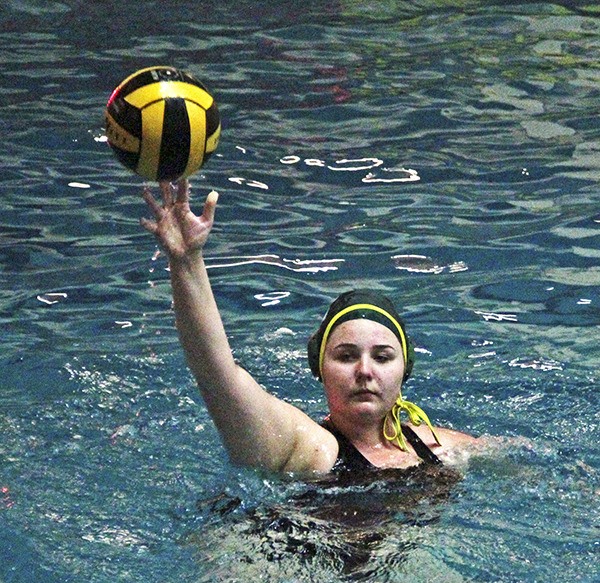There have been meager years for the Auburn girls water polo program.
Less than a decade ago so few students turned out for the team that it had to join forces with Auburn Mountainview and field a joint team.
“We were diluted by Auburn Riverside in 1995 and by Mountainview in 2006,” said head coach Jim Isom.
Last season, Isom’s first year of his second stint with the team – he coached it for 10 years in the 1990s – the team finished in the basement of the East Division, earning just two wins.
Now the team has already matched that win total with a 2-2 record, and the numbers are up, too, with 22 kids in the program.
“I took over last year, and our practice wasn’t right after school,” Isom said. “This year I made the commitment to practice after school, which is hard for me because I work in Seattle.”
Isom said there were just too many instances of kids unable to turn out because they had other commitments in the evenings.
“It became obvious that we would have to have practice after school to get the numbers up,” Isom said. “And suddenly, we had 23 kids.”
Isom said having Mycah Birge – a health, physical education and leadership instructor at Auburn – as his assistant coach has helped a lot.
“They want and encourage [having someone in the program at the school],” Birge said. “I teach a lot of freshmen, so I’m able to get a lot of them to turn out.”
“Having somebody in house really helps,” Isom added.
Four-year starter and senior Brenna Tinsley leads this year’s team.
The team’s leading scorer said having a few more girls in the drink with her has paid off for her game and for the team.
Typically, Tinsley said, she has had to shoulder the weight offensively for the team. With more girls, she’s able to spread it around more.
“It helps to be able to let the pressure off myself and be more of a team player,” Tinsley said. “I have the numbers now where I can trust my teammates to step up.”
Isom said the numbers help to foster a sense of competitiveness amongst the girls.
“Last year everybody was so new, and there were so few that a lot of girls got to play right away,” he said. “I think some of them took that for granted. Now we’ve got so many girls that are fighting for playing time that it’s much more competitive. It really benefits everybody. You have to work to get minutes and a starting position.”
Right now, with so many first- and second-year players who are still learning the intricacies of the sport, Birge said the emphasis is not on winning.
“We don’t really focus on winning,” Birge said. “We focus on what the girls did right, or better, than they did previously.”
Isom added:
“If we lose, we try and look at things like what was the score this year versus last year and what did you do right this time,” he said. “Winning really helps because for us as coaches it’s easier to make them work harder when they see the benefit. It makes it so it’s not just ‘we’re going to lose every game, let’s just have fun.’ They start thinking they can beat some of these teams. The wins will come, they’re already coming this year.”
For Tinsley, the winning is important, but not as important as helping to lead the team and building a cohesive program.
“Different girls learn different ways,” Tinsley said. “You have to help them by showing them but you also have to be pretty vocal about talking them through what they’re doing. We have a lot freshman who had never played water polo. But this is great because these girls will only get better, and the team will only improve.”
Tinsley continued:
“Most important is acting like a team, and if we’re not ahead, staying positive,” she said.
Isom said he also hoped that one of the side effects of building a successful program would be ‘changing the culture’ about water polo as an activity and not a sport recognized by the Washington State Interscholastic Activities Association (WIAA).
“A couple of years ago it was considered an activity,” he said. “It’s not sanctioned, but you have to approach as it more than an activity if you want to be good at it. You have to participate every day at practice. And I think we’re getting there.”


